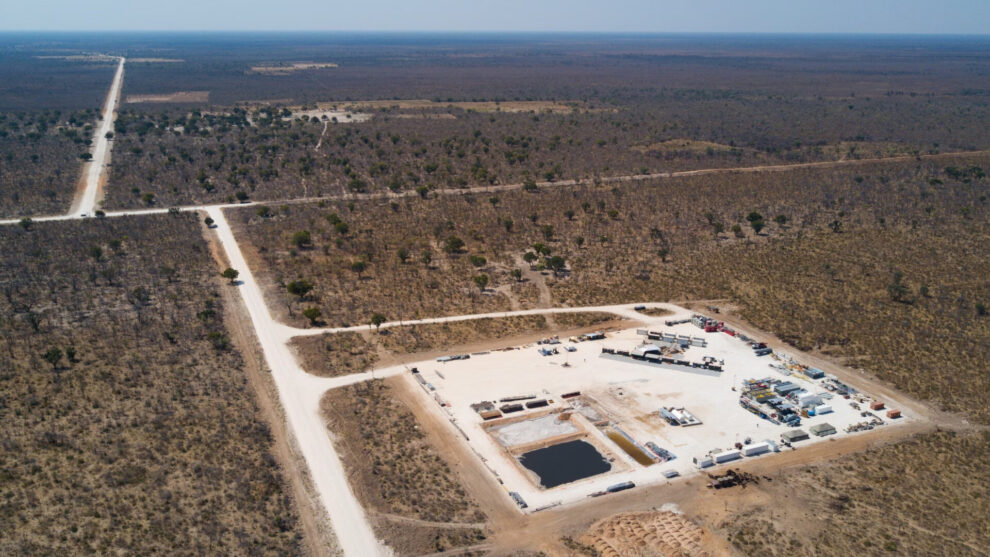The largest remaining population of endangered African savanna elephants roams throughout the region encompassed by ReconAfrica’s licenses, granted by the governments of Namibia and Botswana.
Standing at the border post between Botswana and Namibia, next to the looping streambed of the Okavango River, Max Muyemburuko waved goodbye. As chairperson of Namibia’s Muduva Nyangana community-based wildlife conservancy, he said he had come to warn local community leaders in Botswana about Canadian oil exploration company Reconnaissance Energy Africa’s (ReconAfrica) activities in Namibia. During the past three years, he’s been a vocal critic of the company and the Namibian government.
ReconAfrica has licenses to look for petroleum across more than 13,200 square miles in Namibia and Botswana. Since 2021, the company has drilled three test wells in northeastern Namibia within the Okavango River watershed, but it hasn’t presented any public proof of recoverable oil. ReconAfrica has said it now plans to explore in northwestern Botswana.
ReconAfrica’s license areas are upstream of the Okavango Delta, a World Heritage Site, and within the ecologically sensitive and wildlife-rich Kavango-Zambezi Transfrontier Conservation Area. Five southern African countries established this massive region to protect endangered African wild dogs, black rhinos, and savanna elephants—the continent’s largest remaining population—among a myriad of other animals.
Now it appears that the company has left Namibia, advising certain local workers that they’re no longer needed: “Two of my friends worked for ReconAfrica, but in the last two weeks they have both been told that work is over, at least until 2024,” Muyemburuko told National Geographic on June 9.
At the start of his Botswana visit, Muyemburuko said he’d received news that his home in the town of Rundu had been ransacked. All the door locks were broken and anything of value taken, he said, adding that this was the fourth such incident since December 2022. “I am very afraid and even thinking of leaving the location,” he said, before abruptly heading home from Botswana to deal with the damage. He added, “We don’t know who it is, but this could be connected to my activism in the region.”
National Geographic has detailed ReconAfrica’s operations in Namibia in nine previous articles. Various experts believe that ReconAfrica has failed to fully assess environmental risks. According to official documents and eyewitness accounts, the company has also neglected to line oil waste pits with plastic to prevent groundwater contamination, and it repeatedly drilled before securing all legally required water and land use permits. In Kapinga Kamwalye community-run wildlife reserve, for example, ReconAfrica bulldozed roads and drilled without all proper permissions.
Namibia operations at a standstill
Leon Swanepoel is the manager at the Ngandu Hotel, in Rundu, where many of ReconAfrica’s foreign staff have lived since mid-2021. When asked on June 12 if he believed that the staff had left, he said that a senior ReconAfrica employee told him that they were headed for new oil exploration work in Zimbabwe. Asked if he thought the company’s staff had abandoned ReconAfrica’s drilling camps in Namibia, Swanepoel said, “Yes they did.” He added that although he hoped ReconAfrica would find oil in Namibia, he didn’t “understand why it took them so long to decide whether it’s worth drilling or not.”
Janine Treader, of ReconAfrica, shared a June 8 statement on behalf of the company’s media relations team answering National Geographic’s questions. It said that the company has paused drilling in Namibia while new aerial and seismic surveys are being examined. It also said that ReconAfrica remains committed to the search for oil at “the invitation of the governments of Namibia and Botswana and looks forward to the future of our exploration.” The statement continued, “We plan to be drilling again later this year when additional local and foreign workers will once again be required.”
ReconAfrica faces class action lawsuits in the United States and Canada and awaits a decision from Namibia’s Ministry of Environment, Forests and Tourism that will determine whether the company’s drilling permit will be revoked. In addition, ReconAfrica’s March 1, 2023, filing to Canadian securities regulatory authorities noted “the existence of material uncertainties that may cast significant doubt” on whether it can continue as a “going concern.” In other words, as of the date of that filing, the company noted that its revenues weren’t sufficient to finance ongoing operations.
In a June 15 advertisement in Namibia’s New Era newspaper, ReconAfrica said it is analyzing the information it has collected so far and that “field operational activities will recommence once we begin our next drilling campaign.”
The Ministry of Environment, Forestry and Tourism did not respond to National Geographic’s questions.
Meanwhile, Muyemburuko (and many other) opponents of ReconAfrica’s operations in this parched region—where toxic pollutants from oil drilling can pose a real danger to scarce water supplies for both people and wildlife—hope that the company will decide not to restart work in Namibia. “It’s long past time that they left,” Muyemburuko said.
Source : NATIONAL GEOGRAPHIC
















